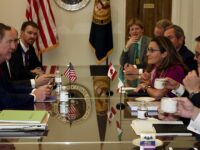The days leading up to a new academic year at a university are typically filled with a mix of excitement and anticipation for both faculty and students alike. My Globe and Mail op-ed notes that this year, it brought trepidation and even fear for many in the Jewish community. At my own university, faculty attended training sessions on coping with potential classroom intruders, including tips for de-escalation strategies and detailed security procedures. Students normally thinking about orientation programming were instead forced to ask themselves difficult questions about whether to conceal their religious or political beliefs, for fear of risking backlash or ostracization from fellow students and even faculty.
Latest Posts
The Law Bytes Podcast, Episode 210: Meredith Lilly on the Trade Risks Behind Canada’s Digital Services Tax and Mandated Streaming Payments
The battle over a digital services tax has been the subject of Law Bytes podcast episodes for several years as the Canadian government signalled its intent to move ahead with one even as US officials warned of risks of trade retaliation if they did so outside of an international framework. With the DST now in effect, what does trade law have to say and how might the US respond? Meredith Lilly is a full Professor and Simon Reisman Chair in International Economic Policy at Carleton University’s Norman Paterson School of International Affairs. She joins me on the Law Bytes podcast to discuss the current digital trade policy tensions, what our agreements say about complaints and retaliation, as well as explain why a U.S. response on at least the DST seems likely.
Abandoning Institutional Neutrality: Why the University of Windsor Encampment Agreements Constrain Academic Freedom and Freedom of Expression
The University of Windsor’s agreements with encampment protesters and a student group have rightly raised concerns about antisemitism given their double standard treatment of Israeli institutions and impact on academic freedoms. While much of the initial emphasis has focused on the ill-advised decision to effectively establish a ban on agreements with Israeli institutions and establish conditions not required for any other country, there is another aspect that deserves attention since it undermines the university’s position as a neutral forum for discussion, debate and learning. In light of the diversity of views on campus and the desire for mutually respectful dialogue and engagement, many universities have tried to remain neutral on matters of sensitive politics post-October 7th. But by committing to engage in political advocacy, including issuing a political letter to the governments, lobbying other universities, and releasing a highly charged public statement, Windsor has abandoned the widely accepted fundamental principle of institutional neutrality, thereby constraining academic freedom and freedom of expression on campus.
The Law Bytes Podcast, Episode 209: Peter Menzies on Why the Canadian News Sector is Broken and How to Fix It
It isn’t news that the Canadian news sector is broken: the Online News Act has caused more harm the good, the dependence on government funding and regulation has grown dramatically and undermined public trust, and implementing Bill C-18 has become mired in controversy. Peter Menzies spent three decades as a working journalist and newspaper executive, most notably with the Calgary Herald where he served as its editorial page editor, editor in chief and, finally, publisher. He then spent another 10 years at the CRTC, including four as Vice Chair of Telecommunications. Peter been one of the most prominent voices on the state of the news sector in Canada and he joins the Law Bytes podcast to discuss recent developments alongside proposed reforms that might do a better job of addressing mounting concerns over the independence of the press.
Why the University of Windsor Encampment Agreement Violates Antisemitism and Academic Freedom Standards
The University of Windsor this week reached agreement with protesters in a campus encampment that raises serious concerns of antisemitism and infringement on academic freedom. While most universities across Canada were relying on the University of Toronto court ruling that the encampments were unlawful trespass to clear their encampments, the University of Windsor instead reached agreement that has sparked alarm among many groups. Indeed, given evidence at the House of Common Justice committee of harassment, antisemitism, and hate speech on the Windsor campus, it is astonishing that the university has ignored those threats and instead concluded a discriminatory agreement that fuels fears that Jews are no longer welcome on campus.











